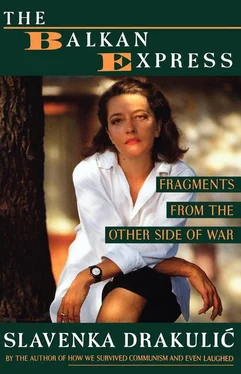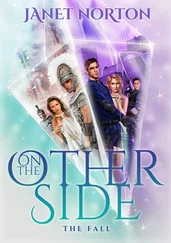Until then, the Slovenian state, the Croatian state, borders, divisions, were somehow unreal. Now, these people with guns in Slovene police uniforms stand between me and Slovenia, a part of the country that used to be mine, too. A few weeks ago I was free to go there. Now I cannot. What would happen if I started to run now? I thought, suddenly remembering the Berlin Wall. Would the smiling young policeman shoot me? Although I was sure that he wouldn’t, for the first time I experienced the border physically: it felt like a wall. In that moment, I knew that everything they say about walls coming down in Europe is lies. Walls are being erected throughout Europe, new, invisible walls that are much harder to demolish, and this border is one of them.
At least I could still go to Slovenia, could travel there, even with a passport. I can’t go to Serbia. I can’t even make a simple phone-call to Belgrade. Perhaps, if I really wished to go there, I could take one train from Zagreb to Budapest, then an overnight train to Belgrade – twenty-four hours of travelling through Hungary, instead four hours on the Intercity train that used to take me direct to Belgrade before the war. But this is not the worst. Going east, there are no more roads, railways, no border; there are only bombed towns, burned villages and piles of corpses no one has had time to bury. What should be the eastern border of Croatia is nothing more than an open wound.
The last time I visited Belgrade was in July, after the Yugoslav Federal Army had attacked Slovenia. As I listened to the news in a taxi from the airport, a speaker said something about an army ‘victory’ there. ‘See!’ the taxi driver said with a triumphant smile, as if this was his personal victory. He didn’t know where I came from. I didn’t say a thing, I didn’t dare. His comment might have been casual and innocent, his triumphant smile a small and unimportant gesture, but it paralysed me with fear. The essence of war was there, growing silently between us.
The mistrust was palpable in the thick dusty air of Belgrade last summer. People from different republics couldn’t talk to each other any more, they stopped trusting. I didn’t like it then, that uneasy feeling of a country shrinking, being eaten by hatred, a country virtually disappearing under my feet. But I didn’t realize that it was going to be amputated in such a painful way. Not only land, but friends were cut off from each other, too. Friendships could hardly survive this war. Could they survive questions like: what did you do in the war? Could we address each other as individuals, or has this possibility been taken from us for the next twenty years? After the war the roles will be reversed and the victims will judge not only the executioners, but their silent accomplices. I am afraid that, as we have been forced to take sides in this war, we – all of us, on both sides – will get caught in that cruel, self-perpetuating game forever, even against our will, and I have no way of knowing if my friends are aware of this yet. If I ask them that question, I make myself into an inspector of their consciences, their souls. If I don’t, I am a hypocrite. But even if they pass this stern test, there remains the divisive fact of war itself – the experience of it, the way it has changed our lives. The fact that my (and their) friend is wounded, another still fighting, I don’t know where. The fact that a mutual friend’s house near Dubrovnik has been burned down. The fact that for a long time I, like everyone around me, didn’t know what to do with a word like ‘future’; I didn’t recognize it, it served no purpose at all. In this war, people have lost words, friends, sons, a sense of life. Even as I write this I hear machine-gun fire nearby. It is 11 pm and I can hear people’s voices and cars passing by. No one stops at the sound of shooting. Neither do I. A chilly thought that these shots might mean someone’s death is pushed away with the excuse that this is a war. Could my friends in Serbia ever understand how war has become an everyday reality for us – the air-raid alarms, the nervous waiting for news, men in uniforms, dark, empty city streets, blackouts, and a permanent engorging sense of fear, that only grows with each passing day?
My friend in Paris who moved there when she was ten years old, at the end of the Algerian war, told me that her teacher had asked her why, even after years of living in France, she walked down a street zig-zag. This is how you walk to avoid a bullet, she explained to her teacher. And this is what the generation of children who survived a war in Croatia will do, walk zig-zag and run to hide in cellars at the sound of an aeroplane.
But the worst are images, because they don’t go away, they stay in your mind and you wake up in the middle of the night sticky with sweat, screaming. Strangely enough, watching it day after day the war teaches you to get used to blood, you are forced to cope with it. After a certain point (which comes very quickly) you realize that people are dying in great numbers and bodies simply pile up like an abstract number on the surface of your mind. In order to survive, you become cruel. You are touched only if you knew the person who died, because in order to comprehend the reality of death you need to identify it, to get acquainted with its face, to personalize it. Otherwise, you feel the pain but it is vague and diffuse, as if you are wearing metal armour that is too tight.
What one cannot escape are images of innocence: children’s faces, a puppy wandering among the charred remains of village houses, a lying dead newborn kitten in a muddy field with its little head strangely twisted, a lost shoe on a sidewalk. On Christmas Day the television reported a particularly fierce attack on the town of Karlovac, some forty kilometres from Zagreb. First the camera showed a distant view of it, with clouds of smoke and dust rising above the rooftops. Then the camera closed in on a street of half-ruined houses and of soldiers picking up a wounded person – so far, it was a fairly average war report unlikely to change the rhythm of one’s pulse. Only when the camera zoomed in on a little house with two smouldering black holes for windows, did I feel as if I’d been punched in the stomach. It was a particularly fine day and the burned shell of the house stood outlined against a deep blue winter sky. A little further on, in front of the house, was a clothes line with a man’s freshly washed white shirt and women’s underwear on it. I could imagine a woman, only a short time ago, standing outside hanging it there. As she returned to the house a bomb fell and everything was over in an instant. The house was in ruins, the people inside had probably been killed. Yet, the shirt and underwear were dangling in a light wind, as if the woman would return at any moment to collect it – clean, dry, smelling of the north wind and distant snow-capped mountains. This was a picture of death itself.
It is January 1992 and by now I know there is no way back. Both borders, the Slovenian and the Serbian one, have taught me my new reality, the fact that I am about to live in a new, a different country with a different shape and a different name: shaped like the core of an apple, and its name incurably associated with blood. However, on the eve of independence (I heard on the news that the European Community is going to recognize Croatia tomorrow, 19 January 1992) I feel ambiguous. I feel robbed of my past, my childhood, my education, my memories and sentiments, as if my whole life has been wrong, one big mistake, a lie and nothing else. I’m a loser, indeed we are all losers at the moment. The Croatian ‘new democracy’ hasn’t brought us anything yet but promises to believe in. The cost is high: renunciation of the whole past and sacrifice of the present.
Читать дальше












